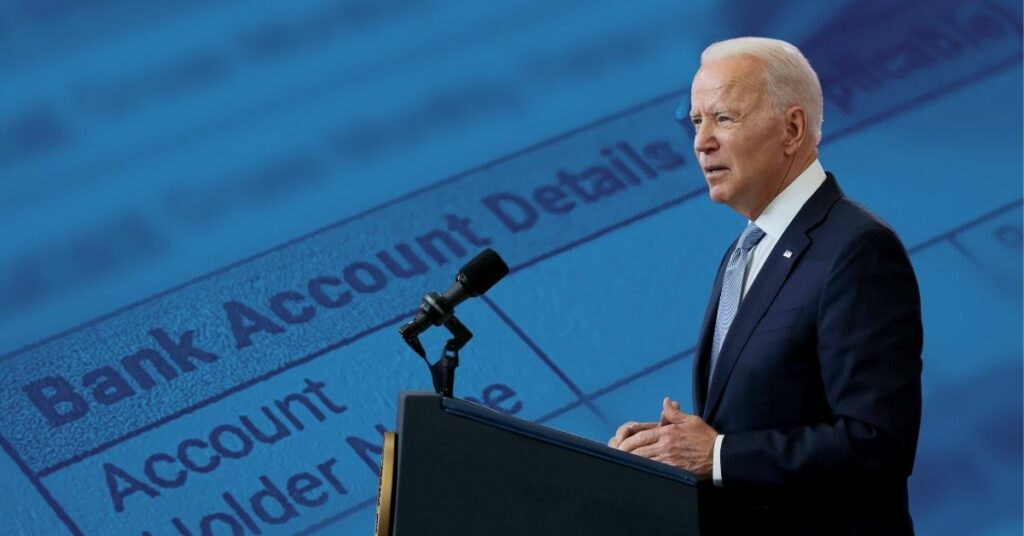The IRS Data Collection Proposal and How It Could Affect You
Daniel Miller

In an effort to reduce tax evasion and close the tax gap, the Biden administration proposed stricter monitoring of financial account activity of those with at least $600 total inflows and outflows. The proposal has been met with strong opposition due to potential overreach, invasion of privacy, and heavy burden on the banking industry. Here’s what you need to know.
President Joe Biden promised major tax reforms during his campaign period. However, when Biden formally unveiled his new tax plan in May, it was met with criticism and opposition. It isn’t the promised tax increase that people are concerned about, though — it’s the potential breach of our financial privacy.
Stricter Monitoring of Bank Account Activity
One of the major points of contention was the greater monitoring power that would be given to the IRS. Under President Joe Biden’s proposed tax reform, banks and other financial institutions would be required to monitor American’s bank account activity more strictly.
Specifically, your bank would need to report the money going in and out of your account if the total reaches at least $600. The greater scrutiny would also apply if your account has a fair market value of more than $600.
Scrutiny of All Financial Accounts
This proposed ruling would apply to all types of financial accounts. That means it doesn’t matter whether you have a business or personal account, all of your total activity worth at least $600 would need to be reported to the IRS. The same goes if you have any loans or investment accounts.
Another aspect of the proposal that drew people’s irritation is the plan to extend this monitoring to finance apps. That means any large transfers, salary deposits, and other transactions you may conduct on PayPal, Venmo, or Cash App would also be reported to the IRS.
A silver lining in this situation is the debunking of the fake news that spread regarding the proposal. Around the time the news first came out, it was wrongly reported that the stricter monitoring and reports would apply to all U.S. accounts and all transactions over $600.
If this had been true, virtually all major financial transactions you conduct — from groceries to rent — would be audited by the IRS.
Greater Monitoring of Contractors and Self-Employed
Additionally, the proposal includes some revisions to the form filed for 1099 workers or independent contractors.
Under the current law, banks are required to file a Form 1099-INT for any customer with over $10 of interest income. If the proposed tax reform is passed, banks would now be required to include two new pieces of information — one for gross annual inflow and another for gross annual outflow.
How the Proposal Could Affect You
The proposal was met with criticism and strong opposition. The pushback comes not only from Republican lawmakers but also from banks and other financial experts. Many pointed out that the proposed tax measures are an overreach of the government and the IRS.
But, how would it affect you personally?
Potential Invasion of Privacy
Critics have noted that the proposal could potentially put your privacy in jeopardy. These privacy concerns are not entirely unwarranted. Over the past summer, a series of news stories on rich people who evaded tax payments were published — all of which were allegedly based on IRS data.
Higher Taxes for the Self-Employed
If you’re a 1099 worker or self-employed, you already likely know the challenges of keeping track of taxes. This is natural, as most of the tax code is written for and applies mostly to established businesses. As a gig worker, you would need to make estimated payments each quarter and even double payments to Medicare and Social Security.
A lot of independent contractors and those with side/part-time jobs are either unaware of this or are negligent of tracking their taxes. As such, the stricter monitoring of the IRS overall total bank activity worth $600 and up may put greater risk on your tax payments getting audited.
With the reporting threshold brought significantly lower than the current $10,000, independent contractors and self-employed or independent business owners could potentially find themselves facing more taxes, as well.
The Bottom Line
Although the proposal could help “close the tax gap” and “prevent tax noncompliance”, it could also place a heavy burden on lower-income earners and financial institutions. It also represents an unprecedented challenge to the rights of individuals under the 4th Amendment. Right now the proposal is still only being considered and may even be revised.
If you’d like to learn more about how to build and protect your wealth, consider purchasing one of our personal finance fundamentals courses today!
Related Articles
How To Quickly Improve Your Credit Score
Bad credit can lead to plenty of issues. It can make it difficult to get a loan, rent an apartment, or even get a job. ...
Read More
Is Debt a Sign of Failure?
Debt is a tricky topic. Some people see debt as a sign of failure, while others see it as an opportunity to invest in something ...
Read More
How To Set and Reach Financial Goals
When it comes to your finances, you would likely love to be in a much better place. But, if you’re honest with yourself, you often ...
Read More







